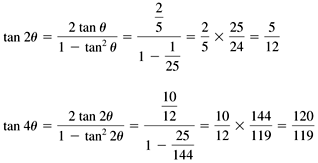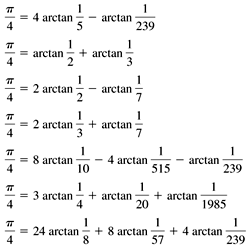13.2 Arctangent Formulas That Generate p
13.2 Arctangent Formulas That Generate p In 1706, John Machin, a professor of astronomy in London, devised a formula for p using the arctangent function. He relied on the fact that for any angles a and b . Then, using an angle q such that Machin's keen observation was that Therefore, And so By taking the arctangent of both sides, he got Since he started with This formula means that, if we have a means to compute the arctangent function to an arbitrary precision, we can compute p to the same precision. But that's exactly what our BigFunctions.arctan() method does. In 1949, the ENIAC computer was programmed [3] to compute 2,035 decimal digits of p using this formula. It required 70 hours, including card-handling time.
Since Machin's formula, mathematicians have discovered other formulas for p that use the arctangent function. Several of those formulas, including the original, are shown in Table 13-2. In Chapter 12, we wrote the BigFunctions.arctan() method using the Taylor series for the arctangent function: for x < 1. Obviously, the smaller the value of x, the sooner the terms will approach zero, and so the faster the series will converge. Therefore, we want to choose the formula with the smallest valued arguments for arctangent. Table 13-2. Arctangent formulas for p .
Program 13 §C2 computes p using the original Machin formula and the fifth formula in Table 13-2. Like the old ENIAC program, it computes 2,035 digits with each formula. Listing 13-2a shows utility class PiFormula in package numbercruncher.piutils . It contains two methods , printPi() , which prints out the computed digits of p , and timestamp() , which returns a string containing the current time and the elapsed time period. Listing 13-2a The utility class PiFormula . package numbercruncher.piutils; import java.math.BigDecimal; import java.text.DecimalFormat; import java.text.SimpleDateFormat; import java.util.Date; /** * Utility class for programs that compute pi. */ public abstract class PiFormula { private static final DecimalFormat DECIMAL_FORMAT = new DecimalFormat("00"); private static final SimpleDateFormat TIME_FORMAT = new SimpleDateFormat("HH:mm:ss.SSS"); protected long startTime; protected long markTime; /** * Print the string containing the digits of pi. * @param piString the string containing the digits of pi */ protected void printPi(String piString) { System.out.print("\npi = " + piString.substring(0, 2)); int index = 2; int line = 0; int group = 0; int length = piString.length(); // Loop for each group of 5 digits while (index + 5 < length) { System.out.print(piString.substring(index, index+5) + " "); index += 5; // End of line after 10 groups. if (++group == 10) { System.out.println(); // Print a blank line after 10 lines. if (++line == 10) { System.out.println(); line = 0; } System.out.print(" "); group = 0; } } // Print the last partial line. if (index < length) { System.out.println(piString.substring(index)); } } /** * Return a timestamp string that contains the elapsed time period. * @param time the starting time of the period * @return the timestamp string */ protected String timestamp(long time) { // Current time in hh:mm:ss. String tString = TIME_FORMAT.format(new Date()); long elapsed = (System.currentTimeMillis() - time + 500) /1000; long hours = elapsed/(60*60); long minutes = (elapsed%(60*60))/60; long seconds = elapsed%60; // Current time followed by elapsed time as (hh:mm:ss). return tString + " (" + DECIMAL_FORMAT.format(hours) + ":" + DECIMAL_FORMAT.format(minutes) + ":" + DECIMAL_FORMAT.format(seconds) + ")"; } } Listing 13-2b shows Program 13 §C2 and its output. The elapsed time in each timestamp, (hh:mm:ss) , is the time required for the computation in the previous line. As we expected, method BigFunctions.arctan() executes faster with smaller argument values. [4]
Listing 13-2b Computing p with two arctangent formulas. package numbercruncher.program13_2; import java.math.BigDecimal; import java.text.DecimalFormat; import java.text.SimpleDateFormat; import java.util.Date; import numbercruncher.mathutils.BigFunctions; import numbercruncher.piutils.PiFormula; /** * PROGRAM 13-2: Arctangent Formulas for pi * * Compute pi with two arctangent formulas. */ public class PiArctan extends PiFormula { private static final DecimalFormat DECIMAL_FORMAT = new DecimalFormat("00"); private static final SimpleDateFormat TIME_FORMAT = new SimpleDateFormat("HH:mm:ss.SSS"); /** * Compute the digits of pi using two arctangent formulas. * @param digits the number of digits of pi to compute */ private void compute(int digits) { int scale = digits + 3; long startTime = System.currentTimeMillis(); long markTime; System.out.println("digits = " + digits); System.out.println("scale = " + scale); BigDecimal big1 = BigDecimal.valueOf(1); BigDecimal big4 = BigDecimal.valueOf(4); BigDecimal big8 = BigDecimal.valueOf(8); // --- First formula --- System.out.println("\n ----- First arctan formula -----\n"); System.out.println(timestamp(startTime) + " START TIME\n"); System.out.println(timestamp(startTime) + " Initializing"); markTime = System.currentTimeMillis(); BigDecimal r5 = big1.divide(BigDecimal.valueOf(5), scale, BigDecimal.ROUND_HALF_EVEN); BigDecimal r239 = big1.divide(BigDecimal.valueOf(239), scale, BigDecimal.ROUND_HALF_EVEN); System.out.println(timestamp(markTime) + " Computing arctan(1/5)"); markTime = System.currentTimeMillis(); BigDecimal arctan5 = BigFunctions.arctan(r5, scale); System.out.println(timestamp(markTime) + " Computing arctan(1/239)"); markTime = System.currentTimeMillis(); BigDecimal arctan239 = BigFunctions.arctan(r239, scale); System.out.println(timestamp(markTime) + " Computing pi"); markTime = System.currentTimeMillis(); BigDecimal term = big4.multiply(arctan5) .setScale(scale, BigDecimal.ROUND_HALF_EVEN) .subtract(arctan239); BigDecimal pi = big4.multiply(term) .setScale(digits, BigDecimal.ROUND_DOWN); System.out.println(timestamp(markTime) + " pi computed"); printPi(pi.toString()); System.out.println("\n" + timestamp(startTime) + " TOTAL TIME"); // --- Second formula --- startTime = System.currentTimeMillis(); System.out.println("\n----- Second arctan formula -----\n"); System.out.println(timestamp(startTime) + " START TIME\n"); System.out.println(timestamp(startTime) + " Initializing"); markTime = System.currentTimeMillis(); BigDecimal r10 = big1.divide(BigDecimal.valueOf(10), scale, BigDecimal.ROUND_HALF_EVEN); BigDecimal r515 = big1.divide(BigDecimal.valueOf(515), scale, BigDecimal.ROUND_HALF_EVEN); r239 = big1.divide(BigDecimal.valueOf(239), scale, BigDecimal.ROUND_HALF_EVEN); System.out.println(timestamp(markTime) + " Computing arctan(1/10)"); markTime = System.currentTimeMillis(); BigDecimal arctan10 = BigFunctions.arctan(r10, scale); System.out.println(timestamp(markTime) + " Computing arctan(1/515)"); markTime = System.currentTimeMillis(); BigDecimal arctan515 = BigFunctions.arctan(r515, scale); System.out.println(timestamp(markTime) + " Computing arctan(1/239)"); markTime = System.currentTimeMillis(); arctan239 = BigFunctions.arctan(r239, scale); System.out.println(timestamp(markTime) + " Computing pi"); markTime = System.currentTimeMillis(); term = big8.multiply(arctan10) .setScale(scale, BigDecimal.ROUND_HALF_EVEN) .subtract(big4.multiply(arctan515) .setScale(scale, BigDecimal.ROUND_HALF_EVEN)) .subtract(arctan239); pi = big4.multiply(term) .setScale(digits, BigDecimal.ROUND_DOWN); System.out.println(timestamp(markTime) + " pi computed"); printPi(pi.toString()); System.out.println("\n" + timestamp(startTime) + " TOTAL TIME"); } /** * Main. * @param args the array of program arguments */ public static void main(String args[]) { PiArctan pi = new PiArctan(); try { pi.compute(2035); } catch(Exception ex) { System.out.println("ERROR: " + ex.getMessage()); } } } Output: digits = 2035 scale = 2038 ----- First arctan formula ----- 02:16:56.680 (00:00:00) START TIME 02:16:56.680 (00:00:00) Initializing 02:16:57.620 (00:00:01) Computing arctan(1/5) 02:48:19.310 (00:31:22) Computing arctan(1/239) 02:57:35.650 (00:09:16) Computing pi 02:57:35.650 (00:00:00) pi computed pi = 3.14159 26535 89793 23846 26433 83279 50288 41971 69399 37510 58209 74944 59230 78164 06286 20899 86280 34825 34211 70679 82148 08651 32823 06647 09384 46095 50582 23172 53594 08128 48111 74502 84102 70193 85211 05559 64462 29489 54930 38196 44288 10975 66593 34461 28475 64823 37867 83165 27120 19091 45648 56692 34603 48610 45432 66482 13393 60726 02491 41273 72458 70066 06315 58817 48815 20920 96282 92540 91715 36436 78925 90360 01133 05305 48820 46652 13841 46951 94151 16094 33057 27036 57595 91953 09218 61173 81932 61179 31051 18548 07446 23799 62749 56735 18857 52724 89122 79381 83011 94912 98336 73362 44065 66430 86021 39494 63952 24737 19070 21798 60943 70277 05392 17176 29317 67523 84674 81846 76694 05132 00056 81271 45263 56082 77857 71342 75778 96091 73637 17872 14684 40901 22495 34301 46549 58537 10507 92279 68925 89235 42019 95611 21290 21960 86403 44181 59813 62977 47713 09960 51870 72113 49999 99837 29780 49951 05973 17328 16096 31859 50244 59455 34690 83026 42522 30825 33446 85035 26193 11881 71010 00313 78387 52886 58753 32083 81420 61717 76691 47303 59825 34904 28755 46873 11595 62863 88235 37875 93751 95778 18577 80532 17122 68066 13001 92787 66111 95909 21642 01989 38095 25720 10654 85863 27886 59361 53381 82796 82303 01952 03530 18529 68995 77362 25994 13891 24972 17752 83479 13151 55748 57242 45415 06959 50829 53311 68617 27855 88907 50983 81754 63746 49393 19255 06040 09277 01671 13900 98488 24012 85836 16035 63707 66010 47101 81942 95559 61989 46767 83744 94482 55379 77472 68471 04047 53464 62080 46684 25906 94912 93313 67702 89891 52104 75216 20569 66024 05803 81501 93511 25338 24300 35587 64024 74964 73263 91419 92726 04269 92279 67823 54781 63600 93417 21641 21992 45863 15030 28618 29745 55706 74983 85054 94588 58692 69956 90927 21079 75093 02955 32116 53449 87202 75596 02364 80665 49911 98818 34797 75356 63698 07426 54252 78625 51818 41757 46728 90977 77279 38000 81647 06001 61452 49192 17321 72147 72350 14144 19735 68548 16136 11573 52552 13347 57418 49468 43852 33239 07394 14333 45477 62416 86251 89835 69485 56209 92192 22184 27255 02542 56887 67179 04946 01653 46680 49886 27232 79178 60857 84383 82796 79766 81454 10095 38837 86360 95068 00642 25125 20511 73929 84896 08412 84886 26945 60424 19652 85022 21066 11863 06744 27862 20391 94945 04712 37137 86960 95636 43719 17287 46776 46575 73962 41389 08658 32645 99581 33904 78027 59009 94657 64078 95126 94683 98352 59570 98258 02:57:36.640 (00:40:40) TOTAL TIME ----- Second arctan formula ----- 02:57:36.690 (00:00:00) START TIME 02:57:36.690 (00:00:00) Initializing 02:57:37.900 (00:00:01) Computing arctan(1/10) 03:19:34.300 (00:21:56) Computing arctan(1/515) 03:27:41.160 (00:08:07) Computing arctan(1/239) 03:36:57.060 (00:09:16) Computing pi 03:36:57.060 (00:00:00) pi computed pi = 3.14159 26535 89793 23846 26433 83279 50288 41971 69399 37510 ... 94657 64078 95126 94683 98352 59570 98258 03:36:57.940 (00:39:21) TOTAL TIME |
| |
| Top |
EAN: 2147483647
Pages: 141



